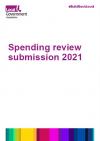
Flooding – watercourse consents
Lead local flood authorities are responsible for ordinary watercourse consents. Altering the flow of a water course such as a river or stream increases the risk of flooding. The advice provided by councils through the consent process minimises the risk of harm to human life and property.
LGA and ADEPT (Association of Directors of Environment, Economy, Planning & Transport) research found that local taxpayers are subsidising 80 per cent of the cost of processing land drainage consent applications because nationally-set fees do not cover the full costs. Government should allow councils to increase the application fee as soon as possible to a level which more accurately reflects the processing costs, estimated to be between £250 and £340. This would support councils to make a more detailed investigation into applications and visit sites where there is a high risk of damage to the site and danger to the public.
Flooding funding – self-assurance of projects
The current funding model for flood and coastal erosion risk management is overly-complicated and not designed to deliver local priorities. The complexity of the application process for grant-in-aid funding from the Environment Agency can result in a situation where it is not justifiable, from a resource perspective, to seek contributions from these sources. This is particularly the case for small schemes when the actual amount needed is relatively small.
Allowing local authorities to self-assure small projects would be far more beneficial for local priorities. This would reflect the increased levels of damage inflicted on communities by surface water flooding, as climate change has intensified the frequency of storms and prolonged periods of heavy rain.
Nature and biodiversity
The implementation of the Environment Bill and the Agriculture Act will bring about cultural change in the way we manage natural resources and address the alarming decline in the numbers of many of our native species.
We welcome confirmation from Defra (the Department for Environment, Food & Rural Affairs) that additional responsibilities on councils in the ‘nature’ chapter of the Environment Bill will be fully-funded through the new burdens process. The requirement for councils to produce local nature recovery strategies and manage a new biodiversity process in new development will require specialist expertise. Implementation of the new legal duties must be accompanied by training for council staff, and access to expertise, and these should be included in the new burden assessment.
